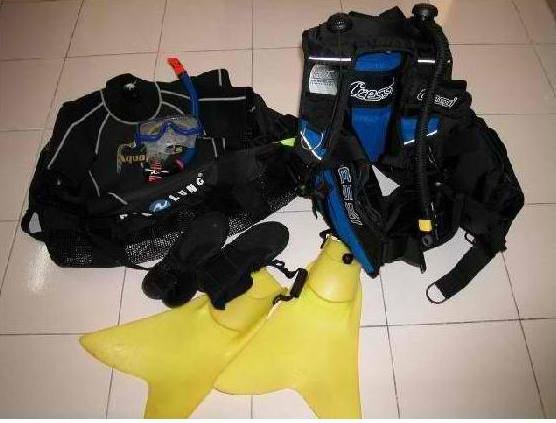Maldives, Galapagos Islands, Belize, Raja Ampat, Fiji, Komodo Island—these are just few of the exotic and breathtaking diving destinations in our planet. Maybe most of you have already heard about them, and even lucky enough to set foot on these wonderful places. Others are still dreaming to visit these places one day, but they just seem so far away, so remote.

A remote dive trip is a trip more into the unknown. Obviously, you need to be prepared for anything and everything!
Photo credit: http://media-cdn.tripadvisor.com/
The first thing a diver should do is choose which remote location he or she is going to explore. If you want to seek the service of a dive operator for your diving trip, it’s always a brilliant idea to inquire in advance if the diver’s safety is their utmost priority. There’s a thin line between diving in popular accessible sites and diving in remote spots. Next, start to imagine the possible resources or scenarios in the area. You can then think of the things you need in your diving adventure.
If you finally got the opportunity to dive on those remote diving spots, there’s still one dilemma that might bug you still: what to bring and what to take on a remote dive trip?
The hardest thing about planning a dive trip is deciding the necessary things to pack and leaving behind those that you can live without. Here’s a checklist of the essential things you might need to take for that remote diving trip:
1. Dive Gear- Whether it’s the mask, fins, snorkel, wetsuit, or dive computer, it is much better if you bring your own scuba gear sans the tank and weights. You can pack everything in your bag. Renting gear at your destination is a viable option. You can also choose to rent the whole set of gear if you don’t have your own or if you prefer to travel light. However, it’s recommended to confirm with the dive operator/centre the availability of the equipment before departure.

It’s always practical and economical to bring your own SCUBA diving gears, if you already got one.
Photo credit: http://vtourist.com/
2. Clothing & Accessories-You don’t need to wear fancy suits or dresses. Casual and light clothes are enough. Tank tops, T-shirts and simple shorts paired with beach sandals or flip flops will do. Of course, don’t forget your swimwear and some pairs of underwear!
3. Toiletries & Medical Supplies- Even just the small but very important personal things like deodorant, toothbrush/toothpaste, lotion, eye drops, and even sleeping pills could make/break your dive trip. Sunscreens also shield your skin from the harmful effects of the sun’s UV rays. Don’t forget to take your prescription drugs if you’re under medication as well.

Most of the remote areas are also densely mosquito-and-bug populated so a mosquito repellent like this could be a life saver!
Photo credit: http://www.towsure.com/
4. First aid kit/equipment- Need to say more? Motion sickness tablets are also appreciated in case of emergency. If you don’t bring your kit, inquire the dive boat/operator and take a look at the fist aid supplies before departing.
5. Important documents- These are very important if you want to ensure a smooth-sailing diving adventure. Certification cards either from SSI (Scuba Schools International) or PADI (Professional Association of Diving Instructors) and logbook should be in hand. Your passport is also required for identification and international travel. Medical certificates might be required so prepare them as well.
6. Camera & Photo Equipment- If you have an underwater camera, you should bring it! Underwater camera housing is also worth packing if you have one. The sun may be too bright sometimes so a filter can be useful. If being an underwater photographer is your bread and butter, then you can opt to carry all your sophisticated DSLR and other photo gadgets/equipment.

Always bring your underwater camera, if you got one. You can’t afford to miss those awesome creatures lurking underwater!
Photo credit: http://www.splashdive.com/
7. Additional items- AC plug adapters, spare parts and batteries, and USB drives are also necessary. And oh, cash and credit cards are essential too! Expect expenses. Don’t spend way beyond your planned budget.

Set aside some adequate cash especially if going to remote areas and where credit card facilities are not feasible.
Photo credit: http://www.rackcdn.com/
It is therefore wise enough to prepare your checklist to make sure you don’t forget any important things. Go over your checklist and determine which items can be left behind. Remember to pack light. We all know that airline companies will charge their passengers with extra fee once they exceeded the maximum baggage weight limit.
Above all things, never forget to pack your common sense and presence of mind in your bag! It can go a long way! Happy packing and diving! 
 Destinations
Destinations









Great suggestions. Out here in Fiji we often have divers from N. America show up without power adapters. N. America is one of the few places in the world using 110V power, most of the rest of the world is 220V, so make sure your electronic items can handle 220V or bring a power converter to downgrade form 220V to 110V.
My other suggestion is to not travel with non-rechargable batteries. You have to pack many and that can add up for your weight allowance. A couple sets of rechargable batteries for your dive torch or underwater strobes can save several pounds in your luggage.
Yes. I agree! power adapters are a must!